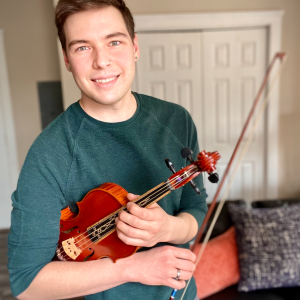
Harkness Chapel, 11200 Bellflower Road
Free and open to the public
Program
View the full program information on this page.
Ornamentation, Improvisation, and Realization: A New Approach to Performing Nicola Matteis’s “Alia Fantasia”
Prelude in G minor, Henry Purcell (1659 - 1695)
A Prelude for the Violin in G major, Thomas Baltzar (1631-1663)
Preludio from Suite in G major, Nicola Matteis Sr. (c. 1670-after 1713)
Fantasia in B-flat major, Nicola Matteis Sr. (unknown - after 1713)
Fantasia in C minor, Nicola Matteis Jr. (c. 1670 - c. 1737)
I. con discretione
Fantasia in A minor, "Alia Fantasia", Nicola Matteis Jr. (c. 1670 - c. 1737)
-Realization by Andrew Hatfield
Partita No. 1 in A major, Johann Joseph Vilsmayr (1663-1722)
I. Prelude: Adagio - Allegro - Adagio - Presto - Harpeggio
II. Aria: Allegro
III. Sarabande: Adagio
IV. Gavott: Allegro - Variatio
V. Menuett
VI. Aria: Adagio - Allegro - Adagio - Allegro
VII. Menuett
VIII. Aria: Allegro
IX. Menuett
X. Guique: Presto
XI. Final
About
Preludes and Fantasias were prevalent genre throughout Europe in the 17th and into the 18th centuries. There are many documented cases of musicians freely improvising them, and the surviving manuscripts and early editions support the perception that these are works that ornament and vary harmonic progressions free of formal structure. This lecture will explore that concept and define what the terms "prelude" and "fantasia" meant, what 17th-century audiences expected from them, and how the practices of performing and composing them changed over time. Specifically, this presentation will examine Nicola Matteis"s "Alia Fantasia," a manuscript page of blocked chords, and argue that performers have significantly more agency in interpreting and performing this work than is traditionally taken. To that end, I have composed and will perform my own realization, along with other works of the genre that influenced my approach.
Historical violinist Andrew Hatfield is pursuing a DMA at Case Western Reserve University, where he studies with Julie Andrijeski. In addition to his work at CWRU, Andrew has presented on performers' agency in university ensemble auditions at the 2019 Oxford Conducting Institute Conducting Studies Conference, performed at the 2018 Musicking Conference at University of Oregon, and presented on historical tunings and temperaments at Marywood University in 2021.
As a performer, Andrew earned his M.M.in violin performance from Michigan State University, where he served as concertmaster of the MSU Concert and Opera Orchestras, member of the new music ensemble Musique21, and concertmaster for many theatre productions, including the premier of Dr. Fox and the Impossible Cure for Death in 2019. Andrew also performed regularly with the Midland, Traverse, and Southwest Michigan symphony orchestras and served as violinist and violist at the 2019 College Light Opera Company and Highfield Philharmonic in Cape Cod, Massachusetts.
Individuals attending Case Western Reserve events are expected to be fully vaccinated, including boosters if eligible. Masks are not required at this time, but we respect the choices of those who elect to wear them. University leaders continue to monitor pandemic developments and will adjust health protocols as circumstances warrant. Learn more about CWRU's COVID-19 response.

